Speaking with Mitchell Plitnick, Rosen, co-chair of the Rabbinical Council of Jewish Voice for Peace, stressed that the views both in his book and [...]]]>
 Rabbi Brant Rosen leads a congregation in Evanston, Illinois and is author of the new book, Wrestling in the Daylight: A Rabbi’s Path to Palestinian Solidarity.
Rabbi Brant Rosen leads a congregation in Evanston, Illinois and is author of the new book, Wrestling in the Daylight: A Rabbi’s Path to Palestinian Solidarity.Speaking with Mitchell Plitnick, Rosen, co-chair of the Rabbinical Council of Jewish Voice for Peace, stressed that the views both in his book and in this interview are his own and do not represent his congregation. Excerpts follow.
Q: How has your personal view of Israel changed in the past four years?
A: I had seen the conflict as two peoples having two legitimate claims to the land of Israel-Palestine and the only way out of the morass is two states for two peoples. I had identified with Israel as a Jew; that was my narrative growing up. I have deep familial relationships there, visited Israel many times, and even considered moving there.
The shift in my views was a gradual thing, but the breaking point was Operation Cast Lead in 2008-2009 (this was the name Israel gave to its assault on the Gaza Strip at that time). I came to realise this was not a conflict between two equal parties but an essential injustice that began with the birth of the state of Israel and has continued since that time. It is a situation of one very powerful party bending the other to its will.
Once I spoke out about Israel’s outrages in Cast Lead, the dominoes really started to fall for me. As a congregational rabbi I was in a difficult place and people looked to me for guidance. About a year after that, I reassessed my relationship as a Jew to Israel, to the entire issue, not just Gaza, but about Zionism in general.
I become more involved in Palestine Solidarity work, reaching out to Palestinians, some of whom were friends and others who were activists in this area. So many of them reached out to me when I spoke out on Gaza, and I wanted to learn from them what their experience of this issue was.
Today, I know where I stand, very much a rabbi in the Jewish community, still serving my congregation, still motivated by Jewish values, but also someone who stands in solidarity with Palestinians in their struggle for human rights, equal rights and dignity in the land they either live in or seek to return to.
Q: Jewish Voice for Peace is one of the leading groups involved in targeted divestment from Israel’s occupation, a part of the Boycott/Divestment/Sanctions (BDS) movement that seeks to bring public economic and political pressure on Israel. How do you see the future of this movement?
A: I think the movement is growing by leaps and bounds, attracting more and more people. When the U.N. vote on Palestine’s non-member status hit, it drowned out another story I thought was actually more important: Stevie Wonder backed out of a fundraising concert for a U.S. group called the Friends of the Israel Defense Forces.
He is the latest celebrity to express his support for the Palestinian cause by cancelling such concerts following a long list of artists and entertainers who have cancelled shows in Israel. Whether they did it because of public pressure or because they believed it to be right, it shows the power of the boycott movement.
To create political change, leveraging people power is the best method; historically, this has consistently been the case. The fact that Israel reacts so harshly against it shows its potential. When Hillary Clinton says 3,000 new settlement units are “not helpful”, that doesn’t get Israel’s attention.
On the other hand, when Jewish Voice for Peace, Students for Justice in Palestine and a wide range of church groups succeed in getting a large holding company to divest from the occupation, that’s front page news in Israel. That is a sign that this has a great impact, when used in a smart and concerted way.
Contrary to the frequent accusations, BDS is not anti-Semitic. I think the argument that it unfairly singles out Israel from other human rights abusers is disingenuous… The question is not whether Israel is legitimate; it exists and is part of the international community. But if Israel acts in an illegitimate way, citizens around the world have the right and responsibility to leverage what power they can to get them to cease.
Q: Do you think the recent call by 15 mainstream Protestant leaders of many different denominations for an inquiry into whether U.S. aid to Israel is in compliance with existing U.S. law is a significant new development?
A: Yes. I think the most important thing is that the leaders are standing firm and are not backing down despite being excoriated and being called everything up to and including anti-Semites. That is important because up until now the covenant on religious relations has been that you can talk about anything BUT Israel, and this time they’ve broken with that.
They have until now been bullied by the Jewish establishment. This can usher in a new relationship where we can talk about anything, not only the things we have in common, but also these issues, like Israeli policy, where we don’t always agree. I’m proud that JVP stood behind the statement.
Jewish leaders said they would walk out of a planned interfaith summit, and demanded a separate summit to discuss these issues. I thought this was very damaging, this is not something resembling dialogue.
The Church leaders have issued a second statement saying they would be happy to meet with Jewish leaders about this, that we’re happy to talk, but we are not going back on what we said. This is very healthy; this is real dialogue, which occurs when you focus on the painful issues you don’t agree on.
It’s very important that Christians see that many Jews do stand with them when they make statements like this. The Jewish establishment does not represent the Jewish community. The Jewish community is much larger and more complex than these unaccountable representatives whose names most Jews don’t even know.
*Rabbi Brant Rosen blogs at Shalom Rav
]]>Now the conservative-leaning channel is zooming in on Iran at State Department briefings and reporting on an Israeli account of two Iranian warships about to pass through the Suez Canal. (I’m planning on addressing Fox‘s report on the apparently developing Suez incident in a piece for the wire, and I’ll post that when it’s up.)
At State, Fox‘s James Rosen honed in on the U.S.’s role in Iran during a briefing. Rosen quizzed a state adviser, Tomicah Tillemann, about how Iran fit into a meeting about the launch of an initiative to reach out to global civil society:
QUESTION: James Rosen, Fox News. Can you expound on how this effort is or isn’t affecting our ability to influence events in Iran?
MR. TILLEMANN: Again, I think that’s a question that we may want to leave to the briefing that will follow this immediately. But it’s a good question.
QUESTION: Is Iran not part of the efforts that you’re involved with?
MR. TILLEMANN: There was an Iranian activist who was present at the table with the Secretary this morning, and Iran is very much part of the discussion on civil society, and it’s a country with a rich history of civil society. As the Secretary spoke about in Krakow, Iran historically has had some of the strongest civil society in the Middle East, and we are eager to do what we can to strengthen that civil society. We think it’s very unfortunate the regime has turned its back on that rich tradition of civil society.
QUESTION: And how do you plan to advance it?
MR. TILLEMANN: We have a number of mechanisms, and we can talk specifics later if you’re interested.
QUESTION: Why is that not a fit subject for discussion with you? You’re the one in charge of the program.
MR. TILLEMANN: I’m – some of those programs are conducted, actually, through other bureaus, and we can talk with some colleagues in NEA and other partners within the Department who will be better equipped to give you specifics on those issues.
Moments later, responding to a reporter from Voice of America, Tillemann added that the Iranian was author Azar Nafisi, who holds some anti-regime views and has spoken before about the need for the West to understand (or at least know about) Iranian civil society.
]]>Coville argues that, as the value [...]]]>
Coville argues that, as the value of the Iranian Rial depreciates against the dollar, many parts of the private sector are unable to do business because the black market for U.S. dollars is drying up. That happened because the U.S.-led sanctions regime against Iran severed the relationships between many Iranian banks and their foreign counterparts.
However, Coville writes (with my emphasis):
]]>[O]ne should not leap to the conclusion that the sanctions are working. The Iranian government has sufficient foreign exchange reserves (due to the oil windfall from 2005 to 2008) and as long as the oil price does not crash (oil exports represent 80 percent of foreign exchange earnings), the Iranian economy will survive. Iranians have in the past showed great talent at finding alternative financial solutions when the usual mechanisms do not work. UAE still plays a central role in Iranian foreign trade, but there has also been a reorientation of Iranian commerce with Asia—China and South Korea being now the second and fourth biggest exporters to Iran. Sanctions on the energy sector may have an impact on the long term, but are unlikely to change Iranian government behavior on the nuclear issue immediately.
The most troublesome aspect of these sanctions, however, is that they are weakening Iranian civil society and reinforcing the networks close to the regime. The Iranian private sector, with no privileged access to the Iranian banking system, is suffering most acutely from the financial sanctions. It is the Iranian worker or member of the “educated” middle-class which will suffer from a higher inflation rate, if the rial depreciation goes on. The companies close to the Pasdarans and the Foundations have enough political backing to get access to the financing they need to survive in this difficult economic environment (they are controlling most of the illegal import networks which generate huge profits).
In fact, these sanctions, by limiting the economic exchanges between Iran and the outside world are constraining the reinforcement of Iranian civil society. This policy of isolating Iran is then in complete contradiction with the positive comments made by the American and European governments about the “mature and democracy-loving” Iranian civil society during the protests of 2009.
Yet CEDAW – Convention of the Elimination of All Forms of Discrimination Against Women – has likely impacted on her life and her daughters, if [...]]]>
Yet CEDAW – Convention of the Elimination of All Forms of Discrimination Against Women – has likely impacted on her life and her daughters, if she has any, in many ways, from pension and inheritance rights to the passport they hold.

Quilt made by women of Kyrgztan. (Unifem)
CEDAW, which was adopted by the United Nations General Assembly 30 years ago today, is the global Bill of Rights for Women, the first international human rights treaty devoted to gender equality.
Through its 30 articles, CEDAW has boosted women’s rights worldwide in many ways.
Some examples: new constitutional guarantees for women in Thailand; land- owning rights for women in Kyrgyzstan and Tajikistan; changes to the law of evidence to benefit women in the Solomon Islands; and reproductive health rights in Colombia.
India outlawed sexual harassment in the workplace, Mexico tightened its domestic violence laws and Morocco passed a new family code in 2004. Read more here.
Today CEDAW turns 30 and is the world’s most widely ratified treaty, with 186 signatory countries.
But there is no time to rest on laurels.
Attempts by conservative forces – from Washington to Jerusalem, from Riyadh to Jakarta – to erode CEDAW are underway, primarily in the field of women’s reproductive rights, nationality, family rights and relationships.
Several countries have failed to ratify the treaty – Iran, Nauru, Palau, Somalia, Sudan, Tonga and the United States, although the Obama administration has indicated it will.
Twenty-two countries have signed and ratified but reserve the right not to implement certain provisions.
Some are minor: Australia does not want to send women soldiers into combat.
Others are more threatening: the United Arab Emirates wants to keep its unequal inheritance laws based on Shariah, and Algeria, its Family Law.
Worldwide, the treaty’s implementation is uneven. In the Occupied Palestinian Territories, Palestinian women suffer abuse and denial of basic human rights at the hands of Israeli settlers and soldiers. The right to family reunification is particularly ignored.
Nevertheless, in three decades, CEDAW has truly changed the world for women, for those who fly on planes and for those who ride donkey carts alike. Equality is our right.
HAPPY ANNIVERSARY!
What had tongues wagging was citizen’s journalism, dispatches by ordinary folk about electoral irregularities from the Rovuma to the Maputo rivers.
Good stuff: government cars illegally used for campaigning, [...]]]>

The sisters can do it by themselves. By A. Vilanculos
The buzz in Mozambique during the recent elections was not the TV debate among presidential candidates debate (there is none) or their programs (all vague).
What had tongues wagging was citizen’s journalism, dispatches by ordinary folk about electoral irregularities from the Rovuma to the Maputo rivers.
Good stuff: government cars illegally used for campaigning, with cellphone pics of their registration plates (until officials wised up and started covering up plates and ministry logos with party posters). Reports of youth tearing downs other party’s posters, fistfights, intimidation, and police lack of impartiality.
On election day, people told of late opening of polling booths and misbehaviour of poll officials and party observers.
Information was relayed by a network of 110 correspondents in 11provinces (most community radio reporters) and concerned citizens who texted, phoned and emailed.
The information was fact-checked and collected in a daily bulletin produced by the Centro de Integridade Publica (an NGO anti-corruption monitor).
The bulletin, in Portuguese and English, was emailed as pdf to some 3,000 subscribers, who redistributed it to at least double this number, and was widely reproduced, for free, by the local press, especially the 60+ community radio stations.
This was watchdog citizen journalism at its best.
Thanks to the Bulletin, Mozambicans had balanced coverage of the pre-poll partial exclusion of the new kid in the block, the opposition MDM, of the instances of ballot box stuffing and the invalidation of 100,000 votes.
The Bulletin provided a credible, professional and impartial source of information, above party politics (Mozambican media is aligned with political parties, ideological blocs and economic interests).
Bits of similar projecst exist elsewhere in Africa but I don’t know of any other so well-rounded.
In Kenya, during the post-electoral conflict two years ago, people texted and phoned in reports of violence to a hotline set up by an enterprising NGO. The information was quickly confirmed and uploaded onto a web map. The press, donors, and people could keep tabs on which parts of Kenya were burning.
Ghana made good use of sms by citizen correspondents during its recent elections.
Imagine if women developed such a tool.
Imagine that the 50-50 Campaign for equal political representation in Malawi could track women candidates during the campaign and the polls, and keep tabs on the insults, the stone-throwing, and the intimidation of women candidates seen last year.
In South Africa, during the 15 days against Violence against Women that started this week, a daily bulletin could keep track of gender-based abuse, collecting reports from police, rape crisis centres, and shelters. This would provide a graphic picture of South Africa’s second epidemic, after AIDS.
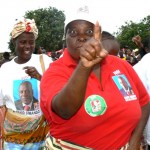
Grab it now! Pic b y A. Vilanculos
Historically, women are the last to use new technologies. This time, we should grab it now!
Check the Take Back the Tech site for cool ideas on taking control of digital technology to end violence against women.
And not only digital – one idea I liked is to go for a walk with a chalk and write up your thoughts on public space.
Watch the sidewalks of my neighbourhood in Pretoria – have chalk and thoughts, will walk.
* Read IPS stories on femicide in Chile, forced sterilisation in Peru and gender-based violence elsewhere.
]]>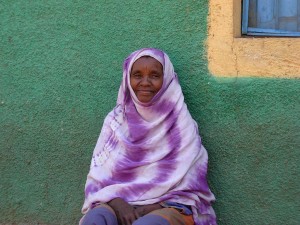
Women manage family health in Ethiopia.
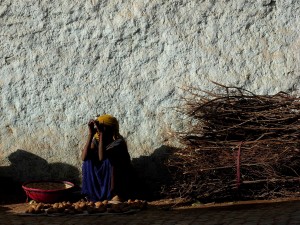
Pics by M. Sayagues
http://www.campaignforrealbeauty.ca/bblank.asp?id=6895
Digital cosmetic surgery – nip-and-tuck, botox and liposuction, on the screen, with a click – render these models picture-perfect (excuse the pun) and thoroughly unreal.
There [...]]]>
http://www.campaignforrealbeauty.ca/bblank.asp?id=6895
Digital cosmetic surgery – nip-and-tuck, botox and liposuction, on the screen, with a click – render these models picture-perfect (excuse the pun) and thoroughly unreal.
There is no way a non-photoshopped woman can attain that perfection. Hey, we are human. We have flaws.
In France and the UK, women lawmakers recently proposed that ads should disclose when their photos have been digitally manipulated to a great extent. They argue that bodily digital perfection in ads undermines the body image and self-esteem of girls and women.
Anorexia, bulimia, eating disorders, obsession with thinness and unnecessary cosmetic surgery follow. Meanwhile, sales of weight-loss products and push-up bras soar.
The tricky problem for lawmakers and advertisers alike is where to draw the line between (acceptable) touching up a pimple or a wrinkle and engaging in full (unacceptable) deception.
Among the most egregious offenders: the French magazine Paris Match nipped the bulging love handles of President Nicholas Sarkozy, in evidence while he canoed bare-chested in the USA.
Oprah Winfrey always has a waist in the cover of O magazine, while flat-chested Keira Knightley miraculously acquired big boobs for her recent Chanel Mademoiselle perfume ad.
The alcoholic drink Campari must have some magical effects on bones because actress Jessica Alba got sharper collarbone and knee definition, longer arms and a tinier waist in its recent ad.
Eating disorders once afflicted mostly affluent white teen girls in the West. Now they have spread across the world, among all ages and ethnic groups and, increasingly, among young men.
It is harder to quantify how the unreal perfect bodies in ads distort the self-image of girls and boys worldwide.
Watch the video and share your thoughts about the proposed disclosure measures.
]]>The UN has finally decided to stand up for women! A decision to create a new agency for women was taken by the General Assembly on September14.
Our colleague Thalif Deen, IPS bureau chief in New York, was the first and only journalist to report it for the [...]]]>
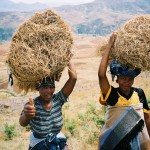
A breakthrough for us as well? M. Sayagues
The UN has finally decided to stand up for women! A decision to create a new agency for women was taken by the General Assembly on September14.
Our colleague Thalif Deen, IPS bureau chief in New York, was the first and only journalist to report it for the first several hours.
But this blog is not to crow about our scoop.
I’m quite excited by the prospect of a new women’s agency with money and political power. No longer will the world’s feminists have to lobby from the outside to put their views on the table. They have now won admission to the high table.
Any one of those bright, articulate, activist women can emerge to lead the agency. The reality is likely to be less rosy. But chances are that, because it’s new, it will be less under the thumb of the old boy network.
You think I’m a romantic? What the hell, there is no harm in dreaming, is there? I like to think that there was no way that the General Assembly could have once again shelved the plan for a new women’s agency.
It’s 14 years since Beijing. All the small and big things that governments were forced to accept around women’s rights (CEDAW, MDG, etc.) made it impossible for any country to block the efforts of myriad initiatives (from small grassroots groups to reforms in government policies even if they started as mere tokenism) and to politicise the cause of gender equality.
I do see great hope in the increasing presence of women in politics – Liberia, Japan, India, wherever you look, even Iran (new ministers) and the Gulf (Saudi Arabia has made a few small concessions to women!).
Of course, there is a backlash too – more violence against women worldwide.
As IPS gender editor, I am sure we will keep track of the new agency as it will be a key player achieving the MDG3 goal – gender equality.
Well, hope springs eternal!
]]>I just attended the Grassroots Women’s International Academy on Home Based Care in Johannesburg, South Africa.
It was a mixed bag of fun meeting women from all walks and works of life from Kenya, Cameroon, Uganda, Malawi, Nigeria, Ethiopia, Rwanda, Zambia, [...]]]>
I just attended the Grassroots Women’s International Academy on Home Based Care in Johannesburg, South Africa.
It was a mixed bag of fun meeting women from all walks and works of life from Kenya, Cameroon, Uganda, Malawi, Nigeria, Ethiopia, Rwanda, Zambia, Ghana, Namibia, Zimbabwe, and South Africa.
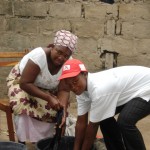
Caregiving in Mozambique. Photo: Janine Morna
The Huairou Commission and the Land Access Movement of South Africa brought us together to share experiences of home-based care.
It is fascinating how in Malawi the care givers alliance has moved forward. Victoria Kalomba, of the Malawi Group of Women Living with HIV and AIDS told us that the ministry of health and social development had spearheaded a campaign to raise awareness about people infected and affected by HIV.
The process had the ministry informing the support groups of individuals who had tested positive after visiting clinics so they could be reached and helped.
I am worried about this way of outing positive people even in the aim of mobilizing support groups. I feel that it is a human right violation to have to give information of someone’s HIV status.
Victoria was less worried. She said that the government has passed a policy that makes any name calling of people living with HIV a criminal offence. Okay.
Yet there is always stigma, just like one hears sexist and racist comments daily. Just because it is punishable has not stopped people from abusing or victimizing others. So I am wary of this and rather uncomfortable.
Next move
For caregivers, the issues are:
· remuneration,
· training and recognition of care givers as professionals,
· logistic and material support,
· psycho-social support to care givers and
· gender equality, and encouraging men to participate in care giving
Our next move is to lobby governments to recognize care work as a profession.

Carers ease the burden of disease. Photo: M. Sayagues
My sense is that there is a need for an alliance to assist in forming one body to represent caregivers. Most women caregivers said they felt disrespected, as they are not recognised for all their care work in health. No thanks are coming their way. They are very sore and disheartened at this lack of recognition. To move forwards, they require a voice to represent them.
One caregiver from Ethiopia said: “I will be taking so much home! I have realised that there are other countries struggling with lack of government support in the area of care work. We hope to continue to be in touch, especially on the issue of the alliance”.
To be able to laugh, as we share these issues, gives one hope. It is a strategy that I feel will take these unsung heroes to greater heights and at some point their voices will be heard.
As we said farewell, I felt a strong bond of sharing experiences and a need to continue the network.
I am sure I will meet most of these passionate women at this week’s SADC Heads of State Summit in Kinshasa, Democratic Republic of Congo, where today GEMSA is launching its report “Making Care Work Count – A Policy Analysis.”
The study covers Botswana, Democratic Republic of Congo, Lesotho, Malawi, Mauritius, Mozambique, Namibia, South Africa, Swaziland, Tanzania, Zambia and Zimbabwe.
GEMSA will strategize with civil society partners to lobby around care work in these countries.
]]>Contributing blogger
Getting into GEAR! What does this really mean in a Pacific Island state, surrounded by an ocean rising rather too quickly, that some of us are thinking about getting into gear before it becomes a sink or swim situation?
Does it mean we switch from [...]]]>
Contributing blogger
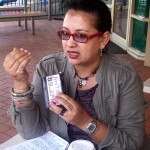
Sharon Bhagwan Rolls
Getting into GEAR! What does this really mean in a Pacific Island state, surrounded by an ocean rising rather too quickly, that some of us are thinking about getting into gear before it becomes a sink or swim situation?
Does it mean we switch from paddling our own canoes at the pace known as “Pacific time” to powering our way into the future with the assistance of fuel guzzling outboard engines?
And as we rapidly negotiate our way through the waters, will we be protected by life jackets should there be any mishaps along the way?
Getting into the UN GEAR!

A snowed UN in NY
What does it mean for Pacific states located across the other side of the world from the United Nations, whose carpeted hallways we tread between the conference and meeting rooms and the cafeteria in New York, while back home mothers, sisters and friends consider the calluses on their hands and feet, as we negotiate language around institutional mechanisms to support the advancement of gender equality?
Time difference, limited resources, poor telecoms and few staff assigned to work on gender equality both in capitals and UN missions are part of the Pacific reality.
This information-divide has resulted in messages being misread around some of the most “man-stream” issues. It is no wonder that sometimes we completely miss the boat in trying to formulate a comprehensive country statement for the Commission on the Status of Women.
And so I was really pleased, in fact quite chuffed that the Pacific statement in March came out clear about UN GEAR:
“We are keen to see the establishment of a strengthened single UN entity dedicated to the advancement of women. This entity would be led by an Under Secretary General and combine normative and operational functions consistent with the proposed composite model.” (option D)
Our statement also demands that the UN system be more accountable and more responsive to the Pacific states and to assist our governments to really understand how gender equality fits into the national development plans.
We are doing more than keeping our fingers crossed that this won’t become the proverbial message in the bottle trying to find its way between New York and any one of the 14 capitals of the Pacific Island member states of the UN.
As part of the GEAR working group, femLINKPACIFIC has developed a media campaign featured in the regional publication, Islands Business International.
We have just completed a fax blitz to national women’s machineries and foreign affairs officials, and we will send out information kits via fast post with enough time to ensure Pacific member states use their valuable vote in the General Assembly in September 2009.
There must be a strong resolution to really demonstrate that the UN and its member states are serious about the women of the world.
Civil society left out
The GEAR campaign is not just about strengthening the UN structure and ensuring substantive financial resources, but to me, just as importantly, about ensuring meaningful, systematic and diverse civil society participation.
After all, women’s civil society organisations have led in making some of the gender equality commitments of the last 20 years become a reality in our homes, in our communities, and in our countries.
We work hard to implement UN Security Council Resolution 1325, CEDAW and the Beijing Platform for Action because we take these commitments seriously. They are not just words on paper.
It is therefore critical to tap into the expertise of a diverse and wide-ranging NGO constituency, including grassroots women.
The Executive Board of the new entity should include one civil society representative from each region, following the HIV/AIDS Programme Coordinating Board model.

Left out in the cold.
After all, we have been left in the corridors. We have trudged through New York snow in winter days at the CSW only to find a meeting that has closed its doors to civil society.
GEAR should be the start of a new journey, not just for the UN, but also the women’s movement.
Women can build and paddle their own canoes. But we never build canoes just for one. We build it so we can take along our children, our families, friends and all the supplies we can manage.
As the UN finalizes the new women’s entity, here’s hoping that it won’t be so high powered that it leaves the canoes behind, but that it will throw out a rope and help the women of the Pacific, of the global south, be a real part of the future journey.
]]>